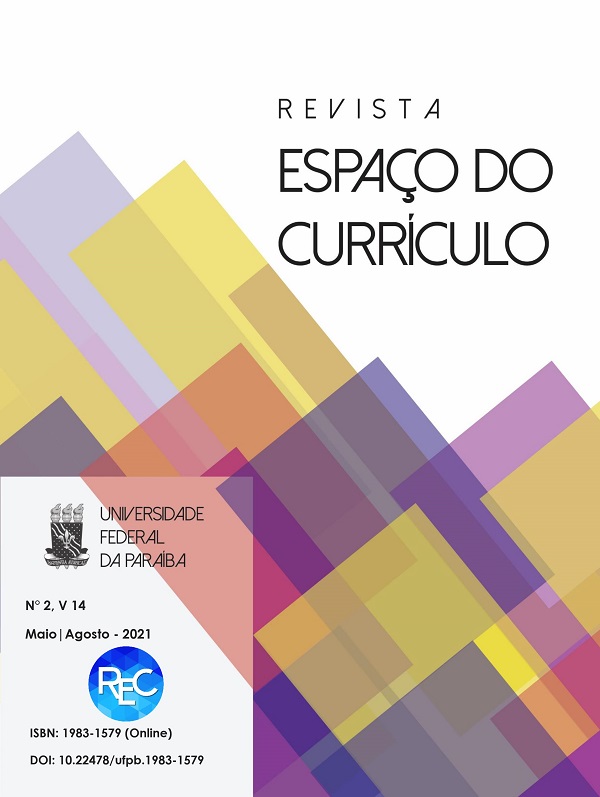EXPERIMENTAL FIELDS IN THE HIGH SCHOOL CURRICULUM, IN SETTLEMENT AREAS IN THE SEMI-ARID
DOI:
https://doi.org/10.22478/ufpb.1983-1579.2021v14n2.58079Keywords:
Rural Education, Experimental Field, Curriculum, Pedagogical Political ProjectAbstract
How are “experimental fields” constituted and functioning in the high school curriculum? what is its importance and contribution to the formation of young peasants in settlement areas in the semiarid region ?, based on these questions, we seek to understand the constitution and functioning of the experimental field in the curriculum of the João de Santos de Oliveira State High School, highlighting its importance for the training of peasant students. The theoretical contribution of the text is based on the studies of Caldart (2009) and Molina (1999), Souza, Nascimento e Silva (2013); Veiga (1998) and Vasconcelos (2002); Moreira e Silva (1994), and Reis e Rocha (2019). The pedagogy of the Landless Movement (2006) is also a central reference for the present discussion. The text is the result of a qualitative, documentary research, the main source of which is the Political Pedagogical Project of the school and some pedagogical reports. The study points out that the experimental fields make it possible to: narrow the school's pedagogical work in the context of agroecology with the agroecological practice of the students' families; greater knowledge and renewal of family farming practices appropriate to the semiarid region, carried out in the communities; greater knowledge of the origin of the seeds and encouragement for the preservation of the Creole seed. Thus, the Experimental Fields are constituted as a place of ex-perimentum of educational practices of Living with the semi-arid region, starting from the school.
Downloads
Metrics
References
BRASIL. Lei de diretrizes e Bases da Educação. 9.394/96. Brasília: Disponível em: http://www.planalto.gov.br/ccivil_03/leis/l9394.htm. Acesso em: 21 de jan de 2020.
BRASIL. Resolução CNE/CEB n.º 1, de 3 de abril de 2002. Disponível em: http://portal.mec.gov.br/escola-de-gestores-da-educacao-basica/323-secretarias-112877938/orgaos-vinculados-82187207/13200-resolucao-ceb-2002. Acesso em: 21 de jan de 2020.
BRASIL. Resolução CNE/CEB nº 2, de 28 de abril de 2008. Disponível em: http://portal.mec.gov.br/escola-de-gestores-da-educacao-basica/323-secretarias112877938/orgaos-vinculados-82187207/12759-resolucoes-ceb-2008. Acesso em 21 de jan de 2020.
CALDART, Roseli Salete. Contribuições para a construção de um projeto de Educação do Campo / Mônica Castagna Molina e Sônia Meire Santos Azevedo de Jesus (organizadoras). Brasília, DF: Articulação Nacional "Por Uma Educação do Campo, 2004. Coleção Por Uma Educação do Campo, nº 5.
CALDART, Roseli Salete. Educação do campo: notas para uma análise de percurso.Trab. Educ. Saúde, Rio de Janeiro, v. 7, n. 1, p.35-64, mar. 2009
MOLINA, Monica. Educação do Campo. In: org. CALDART, Roseli Salete. Dicionário da Educação do Campo. Ed., 2. Rio de Janeiro, São Paulo: Expressão popular,2012.
MOREIRA, Antônio Flávio; SILVA, Tomaz Tadeu da. Currículo, cultura e sociedade. São Paulo: Cortez Editora, 1994.
PACHECO, José Augusto. Escritos Curriculares. São Paulo: Cortez, 2005
KOLLING, Edgar Jorge; NERY, Israel José; MOLINA, Mônica Castagna. Brasília, DF: Articulação Nacional "Por Uma Educação do Campo”, 1999. nº 1.
MOVIMENTO DOS TRABALHADORES RURAIS SEM TERRA (MST). Princípios da educação no MST. Caderno de Educação. MST, n.8, 1996.
MOVIMENTO DOS TRABALHADORES RURAIS SEM TERRA (MST). CAMINHOS DA EDUCAÇÃO BÁSICA DE NÍVEM MÉDIO PARA A JUVENTUDE DAS ÁREAS DE REFORMA AGRÁRIA. Documento Final do 1° Seminário Nacional sobre Educação Básica de Nível Médio nas Áreas de Reforma Agrária. Luziânia/GO, 18ª 22 de Setembro, 2006.
REIS, Edmerson dos Santos. O projeto político-pedagógico nas escolas do campo – um instrumento essencial. In: LIMA, Elmo de Souza; SOUZA, Ariosto Moura de. Diálogos sobre a Educação do Campo. Teresina, Piauí: EDUFPI, 2011.
REIS, Edmeron dos Santos Reis; ROCHA, Adma Hermenegildo. A contextualização curricular insurgente no semiárido brasileiro e a ressignificação dos saberes escolares. In: Reis, Edmerson dos Santos; Teles, Edilane Carvalho. Contextualizar a educação, dar sentido aos saberes. Curitiba: Editora CRV, 2019.
SOUSA, Maria Leomar Pereira de; NASCIMENTO, Cristiane Mendes do; SILVA, José Jonas Borges da. A POLÍTICA DE ENSINO MÉDIO NO CAMPO: a experiência da Escola Roseli Nunes, Assentamento Cigra, Lagoa Grande do Maranhão - MA. 2013. Disponível em: http://www.joinpp.ufma.br/jornadas/joinpp2013/JornadaEixo2013/anais-eixo3-estadolutassociaisepoliticaspublicas/pdf/apoliticadeensinomedionocampo.pdf. Acesso em: 17 mar. 2019.
VASCONCELOS, Celso dos Santos. Planejamento: Projeto de Ensino- Aprendizagem e Projeto Político pedagógico. São Paulo: Leberdad, 2002.
VEIGA, Ilma Passos da. Projeto político-pedagógico da escola: uma construção coletiva. In: VEIGA, Ilma Passos da (org.). Projeto político-pedagógico da escola: uma construção possível. Campinas: Papirus, p.11-35. 1998.
Sites Consultados
SEDUC, 2019. Disponível em: www.seduc.am.gov.br Acesso em 05/03/2021
INEP, 2021. Disponível em: www.inep.gov.br. Acesso em 05/03/2021
Downloads
Published
How to Cite
Issue
Section
License
Copyright (c) 2021 Curriculum Space Journal

This work is licensed under a Creative Commons Attribution 4.0 International License.
By submitting an article to Curriculum Space Journal (CSJ) and having it approved, the authors agree to assign, without remuneration, the following rights to Curriculum Space Journal: first publication rights and permission for CSJ to redistribute this article. article and its metadata to the indexing and reference services that its editors deem appropriate.
















